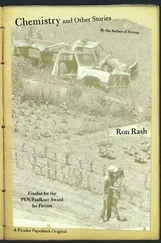Snipes' crew worked alone, having ascended to the summit of Shanty Ridge. As they took a morning break, the men watched Serena moving among the crews to the south. Stewart shook his head in dismay.
"If Preacher McIntyre was here he'd say them carrying on like that is nothing short of idolatry."
"He surely would," Snipes agreed. "He any better, McIntyre I mean?"
"A tad," Stewart said. "Enough that his wife ain't let them doctors electrocute him."
"That's too bad," Ross said. "I was hoping we could fling him in the river and he'd shock us up a mess of catfish. Bring them up the same way you do cranking a telephone."
Snipes unfolded his newspaper and perused the front page.
"What's the scuttlebutt, Snipes?" Henryson asked.
"Well, them park folks seem to be honing in on Colonial Townsend's land over in Tennessee. Says here they've about reached an agreement."
"That tract's big as the one they got Champion to sell them, ain't it?" Henryson asked.
"Says here it is."
"I figured the Pembertons to have bought it," Henryson said. "They was hot after it for a while there till Harris steered them over to Jackson County."
"I heard Harris has got him some geologists over there in Jackson trying to root up a big copper vein," Stewart said.
"Copper?" Henryson said. "I heard it was coal he was looking for."
"I been hearing near everything from silver and gold to Noah's ark to the Big Rock Candy Mountain," Ross said.
"What do you think it is?" Stewart asked Snipes.
"Well," Snipes said reflectively. "It could be a quest for one of the world's immortal treasures, as many a rich man would wish to have his name recorded in the anus of history, but knowing Harris I'm not of a mind to think he'd care much about that."
Snipes paused and picked up a pebble, rubbed it between thumb and forefinger as he might a coin he was unsure he wanted to spend.
"What I'm thinking is that, at least as the crow flies, Franklin ain't but thirty miles away," Snipes concluded. "I'd say that ought to fill in enough of the puzzle pieces for you to figure the rest."
The men were silent for a few moments. Snipes returned to his newspaper as the others continued to look southward. They watched as Serena followed the new spur line into the woods.
"I heard she's just eating bloody beef for her breakfast and supper," Stewart said. "To make that young one of hers all the fiercer. And that ain't the half of it. Come the night she bares her belly to the moon, soaking in all its power."
"I'd say somebody's bull-ragging you, Stewart," Henryson said.
"Maybe so," Ross interjected, "but if somebody told you a year ago she'd train a eagle to go flitting around picking up timber rattlers long as your arm you'd have thought that a rusty too."
"That's true," Henryson said. "We've not seen the like of her in these hills before."
***
IT was in the eighth month of her pregnancy that Serena awoke with pain in her lower abdomen. Pemberton found Doctor Cheney in the caboose ministering to a worker who had a three-inch splinter embedded in the sclera of his eye. The doctor used a pair of tweezers to work the splinter free, washed the wound with disinfectant and sent the man back to his crew.
"Probably something has not lain well on her stomach," Doctor Cheney said as they walked to the house.
Galloway waited on the porch, Serena's horse tacked and tethered to the lower banister.
"Mrs. Pemberton will be staying in today," Pemberton told him.
Galloway made no reply but gazed intently at Cheney's heavy black physician's bag as Pemberton led the doctor into the house.
Serena sat on the bed edge. Her face was pale, gray eyes seemingly focused on something far away, her shallow breaths such as one might use while holding something fragile or dangerous. Serena's peignoir lay open, the dark-blue silk rippling back to reveal her rounded belly.
"Lie down on your side," Doctor Cheney said, and took a stethoscope from his bag. The doctor pressed the instrument to Serena's stomach, listening attentively a few moments. He nodded to himself and lifted the bright-steel bell from Serena's skin, freed the stethoscope's prongs so the instrument hung around his neck.
"All is well, madam," Doctor Cheney said. "It's normal for women to be susceptible to minor, sometimes even nonexistent pains, especially when with child. What you're feeling is probably a mild gastrointestinal upset, or to put it less delicately, excessive gas."
"Mrs. Pemberton is no malingerer," Pemberton said as Serena slowly raised herself to a sitting position.
Doctor Cheney placed the stethoscope back in his physician's bag, pinched its metal snap closed.
"I don't mean to imply such. The mind is its own place, as the poet tells us, and has its own peculiar reality. What one feels one feels."
Pemberton watched Cheney flatten his hand as if preparing to pat his patient on the shoulder, but the physican wisely reconsidered and let the hand remain by his side.
"I assure you that she will be better by tomorrow," Doctor Cheney said when they stepped back out on the porch.
"Is there anything that will help until then?" Pemberton asked, nodding at Galloway sitting on the steps. "Galloway can go to the commissary, to town if necessary."
"Yes," Doctor Cheney said, addressing Galloway. "Go to the commissary and fetch your mistress a bag of peppermints. I find they do wonders when my stomach is sour."
Serena stayed in bed all day. She insisted Pemberton go to the office, but he did so only when she agreed to have Galloway stay in the front room. When Pemberton returned to check on her at noon and then later in the evening, Serena told him she felt better. But she remained pale. They went to bed early, and as they settled into sleep Serena pressed her back and hips into Pemberton's chest and groin, took his right hand and placed it on the undercurve of her stomach as if to help hold the baby in place. Music filtered up from the dining hall porch. Pemberton drifted to sleep as a worker sang of a woman named Mary who walked the wild moors.
The next morning Pemberton was awakened by Serena sitting up in the bed, the covers pushed back to her feet, left hand pressed between her legs. When Pemberton asked what was wrong, Serena did not speak. Instead, she raised the hand to him as if making a vow, her fingers and palm slick with blood. Pemberton jerked on pants and boots, a shirt he didn't bother to button. He wrapped Serena in the peignoir and lifted her into his arms, snatching a towel from the rack as he passed the bathroom. The train was about to make an early run to the saw mill and men had collected around the tracks. Pemberton yelled at several loitering workers to uncouple all the cars from the Shay except for the coach. Mud holes pocked the ground, but Pemberton stumbled right through them as men scurried to separate the cars and the fireman frantically shoveled coal into the tender. Campbell rushed from the office and helped get Serena into the coach and lain lengthways on a seat. Pemberton told Campbell to call the hospital and have a doctor and ambulance waiting at the depot, then to drive Pemberton's Packard there. Campbell left the coach car and Pemberton and Serena were alone amidst the shouts of workers and the Shay engine's gathering racket.
Pemberton sat on the seat edge and pressed a towel against Serena's groin to try and stanch the bleeding. Serena's eyes were closed, her face fading to the pallor of marble as the engineer placed his hand on the reverser, knocked off the brakes and opened the throttle. Pemberton listened to the train make what seemed its endless gradations toward motion, steam entering the throttle valve into the admission pipes and into the cylinders before the push of the pistons against the rod, and the rod turning the crankshaft and then the line shaft turning through the universal joints and the pinion gears meshing with the bull gears. Only then the wheels ever so slowly coming alive.
Читать дальше












